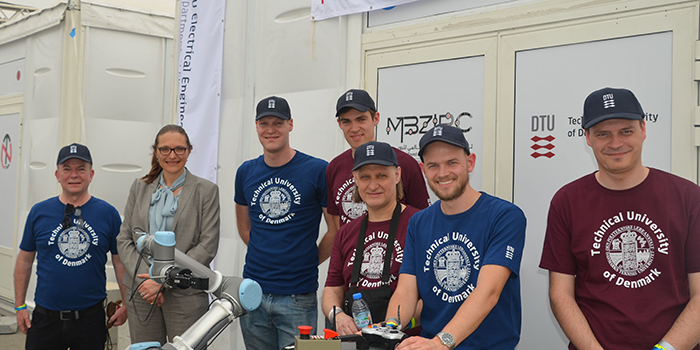One silver medal and a fourth place overall was the result of DTU’s participation in a robotics competition last week.
Not surprisingly, the German and Swiss teams won the new robotics competition ‘The Mohamed Bin Zayed International Robitics Challenge’, in Abu Dhabi. The competition ended on Saturday, 18 March after three days of competing in four different disciplines involving both mobile robots and robot helicopters.
“We’re delighted that DTU is hot on the heels of ETH Zürich and the University of Bonn, which rank among Europe’s best technical universities. Technically speaking, we are fully on a par with them, but they were faster than us. Often, small margins decide who wins a competition like this, where unpredictable elements such as weather conditions always exist. But we’re proud to have come in second in one of the disciplines and to win fourth place overall among the 25 participating universities,” explains Ole Ravn who is heading DTU Electrical Engineering’s automation work.
In addition to ETH Zürich and the University of Bonn, a Czech-US joint venture finished ahead of DTU overall.
More focus on sensor technology and real-time
Academically, the competition among the world’s elite universities convinced Ole Ravn that both research and teaching at DTU need to increase focus on sensor-based technology and real-time adaptation.
“Tomorrow’s robots will be sensor-based, allowing them to react to changes in their surroundings. In addition, there’s no doubt that real time will have increased importance, meaning that the robot must react at precisely the right time—and neither a couple of seconds too early or too late,” he adds.
The competition in Abu Dhabi will be held again in two years, and Ole Ravn imagines that DTU will be participating again.
“Technically speaking, we are just as competent as the other universities, and with slightly better conditions, e.g. for allowing drones to fly indoors here at DTU, we could have done even better in this year’s competition. We hope that this will be possible in future so that both research and education within drone technology can be strengthened—instead of it taking place at the corner of a grass field on the outskirts of campus,” says Ole Ravn.

- A robot helicopter must land on a truck that moves around in figures of eight on an area the size of a football pitch.
- A mobile robot must find a big box on the same pitch. There is a valve on the box and six randomly placed spanners. The robot must choose the right spanner and unscrew the valve.
- Three robot helicopters must find objects, for example coloured round discs on the pitch, pick them up, and throw them into a paper bin.
- All three above-mentioned tasks must be solved at the same time with a total of four helicopters and a moving robot on the pitch.